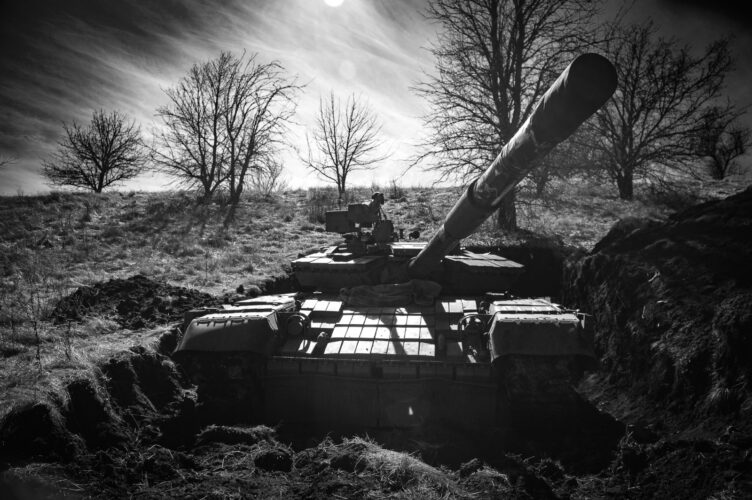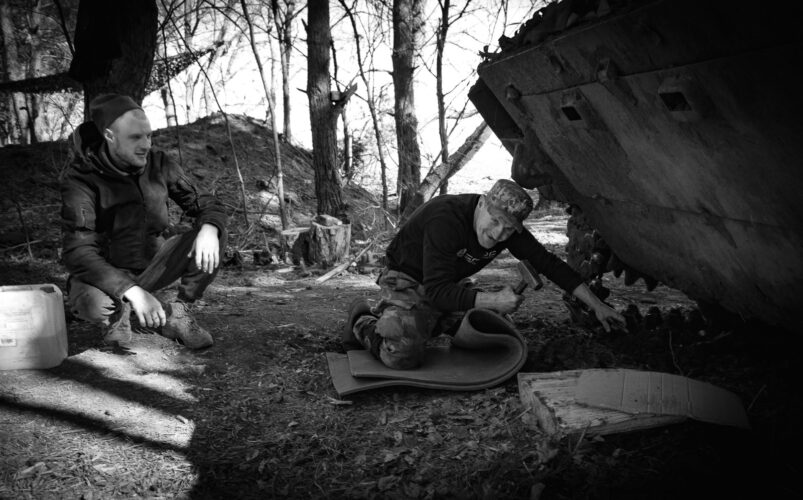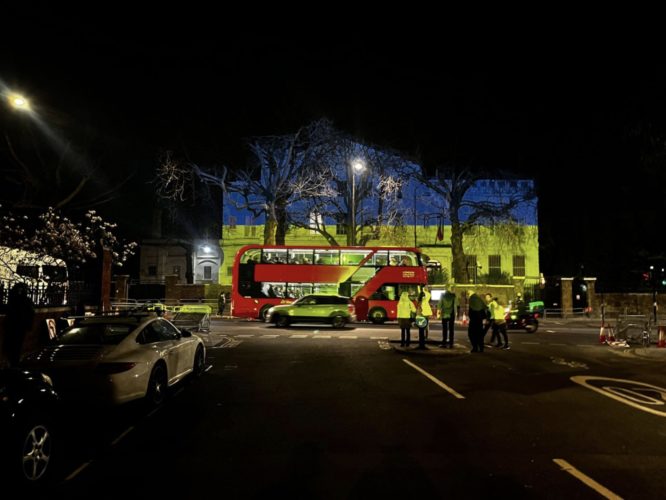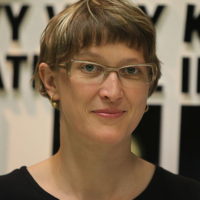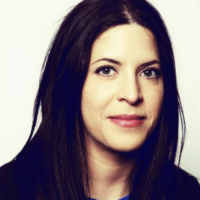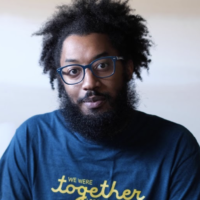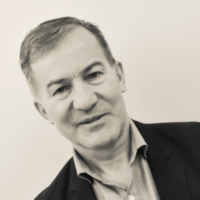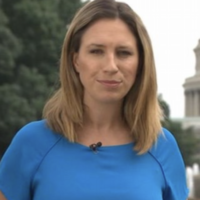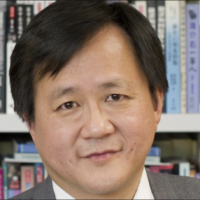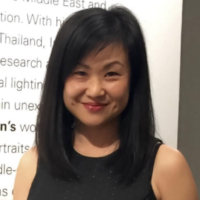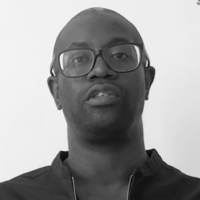A Handful of Dust: a Photography Exhibition by Nish Nalbandian
A humanistic photographic portrayal of everyday life of Syrian refugees living in Turkey formed the subject of a talk at the Frontline Club on Tuesday 17th April.
The award-winning photographer Nish Nalbandian came in for a conversation with documentary filmmaker and journalist Matthew Cassel for his latest book, A Handful of Dust – a 148 page reportage of Syrians forging new lives in southern Turkey.
Some of the slides from the book formed the background of the conversation and Cassel started by asking Nalbandian if he could explain his work in his own words. He said:
“There are almost 3 million Syrian refugees living in Turkey and every time I send pictures out for publicity they, (the media), want to run pictures of refugee camps but since many don’t live in camps I only have two pictures of them in the book. They in fact live all over…you’ll find people living in villages, some squatting in camps or renting apartments in smaller towns and cities in Istanbul and Ankara. So, it’s hard to give a blanket statement about what people are doing and where they are staying.”
He showed pictures of Rehanli in Hatay province and explained how he spent an afternoon with the family where the local farmer let a family of refugees stay but the building was not suitable for winter. The only help they had received from the Turkish government were bags of coal that the photograph showed the children playing with. Nalbandian said: “I was there right before Christmas and it struck me how happy the kids were because they had these bags of coal to play on.”
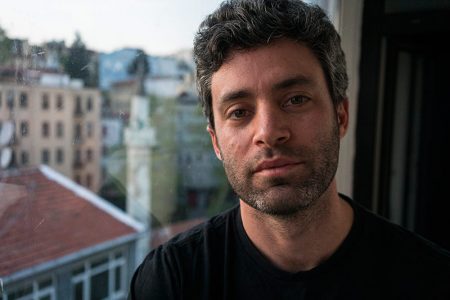
Matthew Cassel, who hosted the event is an award-winning filmmaker and multimedia journalist based in the Mediterranean region.
As a majority of the pictures were of the refugees living outside camps Cassel asked Nalbandian how they were supported, he said, “by everyone and no one”. He pointed to the efforts of Turkish people, from Syrians themselves and international NGO’s. He also added:
“But some families were not on the radar and they don’t register, (for fear of being put into camps). The Turkish Red Cross/Red Crescent does have programmes, but it doesn’t reach everyone.”
Tomorrow: @frontlineclub are hosting award-winning photojournalist Nish Nalbandian and showcasing his portraits from "A Handful of Dust". The exhibition focuses on Syrian refugees living in Turkey. Get your tickets here https://t.co/VSuGgWVvc4 pic.twitter.com/kVjxmuHdPY
— One World Media (@onewm) April 16, 2018
Talking about the title of the book Nalbandian said it is selected from T. S. Eliot’s poem, The Waste Land, as it captured the way in which people were scattered from their homes. He also commented that the book starts with images of camps, showing the refugees eking out an existence but explained: “The whole book is not like this, which I hope you’ll see.”
He added that he has stayed in touch with almost all the families he photographed but most them move on and the neighbours of one particular family he depicted said they chose to go to a camp in order to access essential services and care.
Talking about his thoughtful approach to representing everyday realities of migrants and refugees Nalbandian said: “I think it’s important to get to know what they are feeling and get a sense of what’s going on with them and that emotional connection is important, it’s what gets you the picture.”
In terms of photographic equipment Nalbandian took a a medium-format film camera instead of just shooting Polaroids. He suggested: “It gave a formality to the picture and to the process and people responded to that, they felt you’re taking the time to do something import for them.”
“It struck me what was happening now was something which had happened previously with the Armenians”- Nalbandian talking of his own Armenian heritage and his interest in documenting migration stories pic.twitter.com/In6LyCNSLH
— Frontline Club (@frontlineclub) April 17, 2018
Toward the end of the talk Nalbandian paused in front of a panoramic view of Gaziantep, a city where some of the subjects of his book lived, and said it had a particular resonance with him as it showed an old Armenian Catholic church now being used as a mosque and this reminded him of his own Armenian heritage. He explained:
“It struck me how in 2015 I was documenting a migration a hundred years later on exactly the same routes, just in reverse. There was a huge flow of people in 1915 from Anatolia (present-day Turkey) to Syria. The reason why I do portraitures like this is because I have a photograph of my grandfather from 1915 in Iskenderun, southern Turkey wearing his French Armenian Legion uniform and I wanted to make portraits that spoke to me in that way. I would like to go back and recreate that portrait and have people stand in the same pose using the 8×10 old film camera to show people in the same place a hundred years on. ”
One of the points raised in the Q&A session was if the people he photographed wanted their stories to be told, To this he said:
“In many cases yes, especially early on 2012 people were clambering to tell their stories. Later on, I think they became jaded saying, ‘telling my story isn’t going to make a difference so please leave me alone’. In cases like this I sat down and talked to them and asked them to tell their story anyway, but I don’t think many at this point think their stories will make a difference.”
During the evening numerous other comments and questions followed on the intricacies of refugees’ lives and how Nalbandian had tried to show among others people who were enterprising and trying to move away from the tragedies bought on by the war.
Frontline Fixers Fund Dinner 2018
Safa Al Ahmad, Jeremy Bowen, Lindsey Hilsum, Christina Lamb and Sean Langan invite you to the annual fundraising dinner for the Frontline Fund.
The Frontline Fund was set up in 2007 following the murder of Ajmal Naqshbandi in Afghanistan, with the aim of raising money for the families of media workers killed or injured around the world while working with the international press.
Without the support of media workers, foreign journalists could not operate in the field. They are the unsung heroes of the industry and too often pay the highest price, remaining in the field once the foreign journalists have left.
The evening will begin with a drinks reception in the clubroom from 7pm, followed by a sit down dinner. Join us to support this important cause – the cost of your ticket will help support the Frontline Fund for another year.
Ticket cost £100
Tickets are limited
THE HEROES OF CHERNIHIV – A photo essay by Paul Conroy
In war, legends are born, and reputations made, no more so than in the case of the First Tank Brigade. The Brigade battled to repel Russian forces who failed in their attempt to besiege Chernihiv, and later the Brigade went on to secure the highway to Kyiv and prevent the Russian advance on the capital. For these actions, they received the Courage and Bravery Award from President Zelensky, and their reputation was born. They are also highly elusive.
A Soviet-era T64BV of the First Tank Brigade. Donbas, Ukraine.
Zerina Zelinsky, a close friend and travelling companion in Donbas, had a fix on them and a half promise of access. We left Kramatorsk, a town close to Bakhmut and a target for long- range Russian rockets, at 4 am to rendezvous with her contact.
We travelled South for three hours to an undisclosed location close to the frontline. As we neared the eight-figure grid reference, we faced many checkpoints. When asked for our destination, we naturally said, “First Tank Brigade,” and received sceptical, ‘Do they exist’ looks in return.
At 7 am, we spotted a 4×4 that signalled us to follow. We weaved through a patchwork of villages and open fields for the next thirty minutes – not a tank in sight. When we finally stopped driving, the first thing that hit us was the low rumble of artillery barrages drifting across the rolling countryside. We were told to park under a tree by our contact, “Drones,” he warned us, looking to the sky, “they are everywhere.”
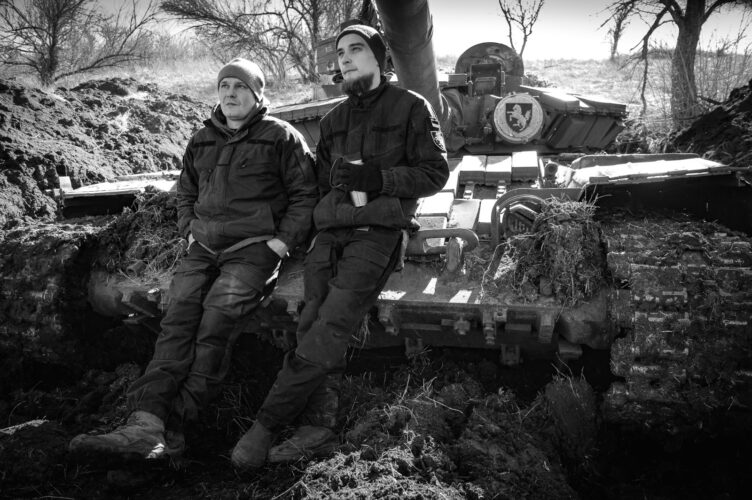
Dima and Vlad of the First Tank Brigade
Dima and Vlad (names changed) emerged from a dilapidated cottage typical of Donbas, looking slightly drowsy at the early wake-up call. They had been serving together since November 2022, and their closeness was apparent. They pulled on mud-caked boots and told us to put on full-body armour and helmets. We set off through the village and entered a wide- open plain offering zero protection.
The heavy tank tracks had churned up the fields, and the going was arduous in full kit. On route, our escorts pointed to dozens of shell holes pockmarking the ground. “Don’t worry,” they said casually, “they never shell us till the afternoon.”
After an hour of trudging through the mud, I spotted the first of the tanks, parked deep in a gun pit carved into the hillside and covered in camo netting. As we drew closer, I spotted two similarly disguised tanks.
Dima explained their setup. The platoon, made up of three tanks, were all Soviet-era T64BV, with an average age of 40-50 years, some as old as 70. As a result, maintenance is critical, and the tanks are fired up daily to keep them combat-ready. “We’ll do a circuit. It’s good for them,” said Vlad. “Really,” I thought, looking up at the sky, the drone warning running through my head.”
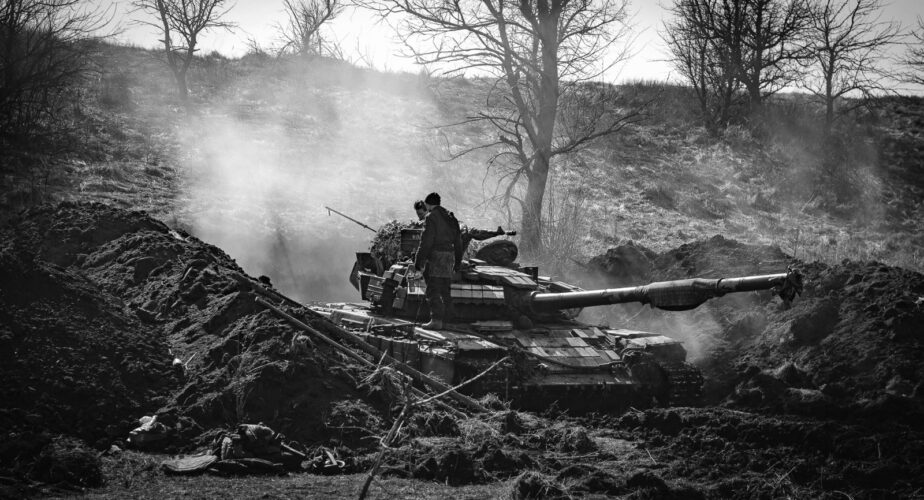
The T64BV is fired up as part of its daily maintenance.
They pulled back the camo nets and fired up one of the beasts. “That’s it,” I muttered, “even a half-blind drone couldn’t miss the huge puff of diesel and black smoke that belched from the ancient engine.” The thunder of artillery seemed even louder now, but they remained unperturbed.

A T64BV is being put through its paces.
For a fifty-year-old machine, the tank performed as if it had just rolled off the production line, smoothly hugging the terrain as it crested the peaks of the small hills and turning gracefully on the churned-up earth. Then, with remarkable skill and proficiency, they slid the tank back into its pit; moments later, it blended into the surrounding hills. Understandably, they could not discuss their plans. Still, given their record, I suspect they are laying low and waiting for the onset of the much-vaunted Ukrainian spring offensive.
A half-hour drive later, we were in a deep forest, and they had a surprise. Earlier that morning, they had disabled and captured a Russian T80 main battle tank, one of the few captured relatively intact in the whole war. “We’ll fix and use it,” said a beaming young mechanic in the forest maintenance area.
Everywhere, the carcasses of tanks sat in various states of destruction and repair. In small clearings, mechanics battled to get the machines ready for war. Still, the sense that they could, against all odds, beat Russia was palpable as they set about the seemingly impossible task of keeping these old machines battle ready.
Having seen the result of modern anti-tank weapons on these ageing machines, I felt intense respect for the young men, the Heroes Of Chernihiv, who would soon mount up and lead the counter-offensive charge, now only weeks away.
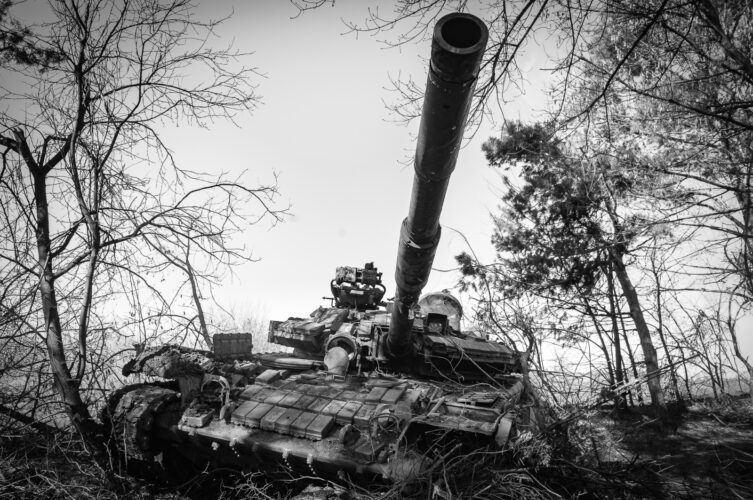
A captured Russian T80 main battle tank.
Peter Jouvenal press release
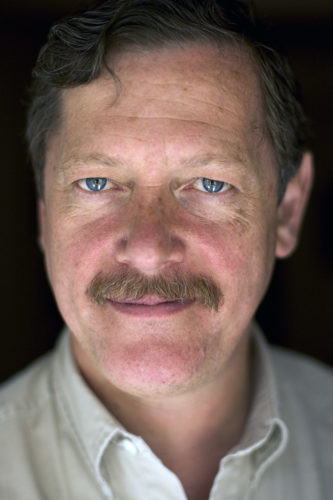
Peter Jouvenal
Peter Jouvenal and 4 other captured Britons were released yesterday from a prison cell in Kabul
where they had been detained by the Taliban for over 6 months.
Peter is a founding Frontline News cameraman and former freelance journalist now turned
businessman. He filmed the first western interview with Osama Bin Laden in 1997.
Negotiations for his release were run from the British side by the UK Foreign Office (FCDO)
and representations were made to the Taliban through their office in Doha.
Although the Taliban never publicly confirmed the detention of foreigners or stated the charges
against them, a senior member of the group welcomed the decision as “good news” adding that
the Taliban as an organisation were “not aiming to detain foreign nationals”.
A Foreign Office spokesperson said that it welcomed the decision to release the five and said it
regretted the episode and wished to apologise on behalf of the captives “for any breach of
Afghan culture, customs or laws, and offer their assurance of future good conduct”.
Hugo Shorter, chargé d’affaires at the UK mission to Afghanistan in Doha, issued this statement:
“To promote peace and stability, to deliver essential humanitarian support to the Afghan people
and to address shared concerns on security, there is no alternative to engaging pragmatically with
the current administration of Afghanistan, and that is what we are doing.”
Frontline News founders Vaughan Smith, Richard Parry and Adam Kelliher expressed their relief
after many months of campaigning for Peter’s release.
After a layover flight, Peter is returning to the UK where he will be reunited with his wife
Hassina, his three daughters, friends and family.
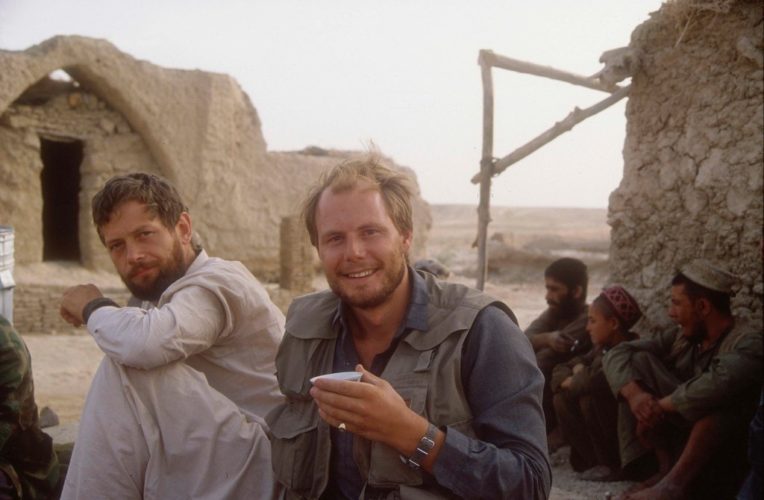
#FreeAlaa: ‘You Have Not Yet Been Defeated’
Day 54 of the hunger strike: British-Egyptian writer, blogger and political activist Alaa Abd-El-Fattah is, yet again, in prison.
Prosecuted by every Egyptian regime that has ruled in his lifetime, Alaa tirelessly fights for democratic expression and freedom of speech.
His writings have been smuggled out of prison and collected into a book ‘You Have Not Yet Been Defeated’. It transcends borders, fighting for ideas over tyranny.
Yesterday evening at Frontline Club Andrew Marr hosted a conversation with Alaa’s sisters, Mona and Sanaa, to highlight the Free Alaa campaign, raise awareness and provoke government action.

On hunger strike since April 2nd, Alaa is in a fragile condition. He has been living in a cell, deprived of light, unaware of time and kept away from reading materials. “This is serious psychological torture”, says Marr.
The sisters explained he is physically weak but psychologically in a much stronger position:
“What I’m about to add is alarming”, warns Mona. “We think Alaa has decided he wants an end to all of this. He wants the end to be guided by him rather than just imposed on his body. We feel he has decided to take this hunger strike until the end. Either it pushes us enough and triggers enough pressure to get him out of this endless loop of Sisi’s prisons or it will end his life”.
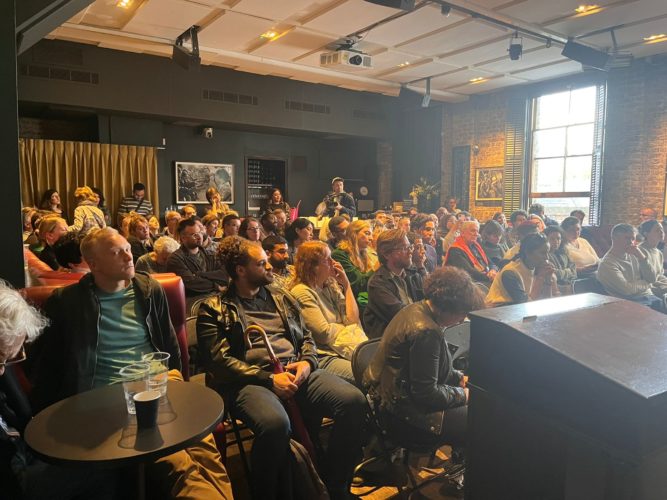
In 2011, Egyptians took to the streets. They dreamt of democracy and chanted for “bread, freedom and social justice”. This led to Hosni Mubarak’s downfall but he was replaced with a string of oppressive regimes; there are thought to be 60,000 political prisoners in Egypt today.
Echoing Alaa’s statement “Fix your own democracy”, Andrew Marr ended on a note directed to the UK audience:
“Tomorrow at Westminster, there’s going to be a crisis about Boris Johnson and the Sue Grey report. We’ll be talking about the condition of our democracy, whether rules are adhered to and whether people survive or don’t. I don’t know what’s going to happen but I do know nobody is going to be killed because of that. Throughout all of this, there will be a quiet patting of the backs about us being, in the end, a proper open democracy. And none of that really means anything unless we support those values around the world and we support Alaa. We still do have a system where politicians are responsive to public pressure and I would urge everyone to act…he is a very important voice that the world cannot afford to lose.”
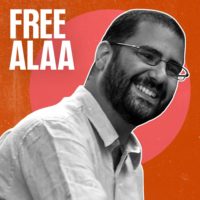 A recording can be found here: https://youtu.be/fQQhkfH6T3M
A recording can be found here: https://youtu.be/fQQhkfH6T3M
Nina K Watson reporting from Frontline Club
@ninakwatson
Western Ukraine’s city of Lviv was struck by four Russian missiles 18th April 2022
Western Ukraine’s city of Lviv was struck by four Russian missiles in the early hours this morning. The death toll rose to seven early afternoon.
Nina Kropotkine-Watson and Paul Conroy reporting from the the scene of a rocket attack in a city that has – until now – been thought of as relatively safe.
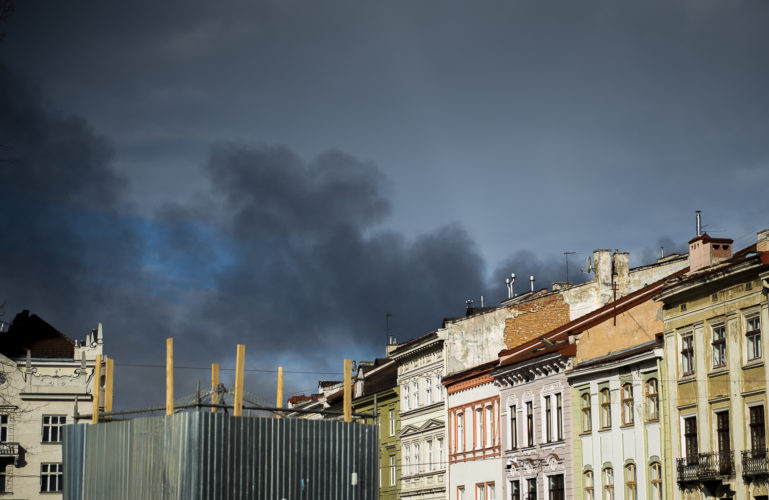
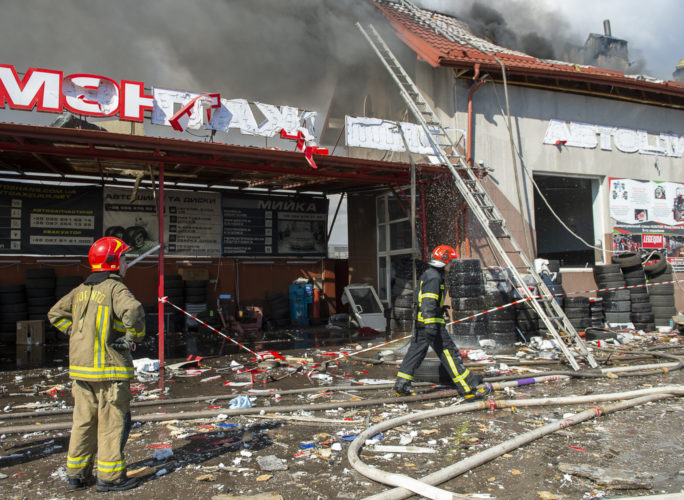
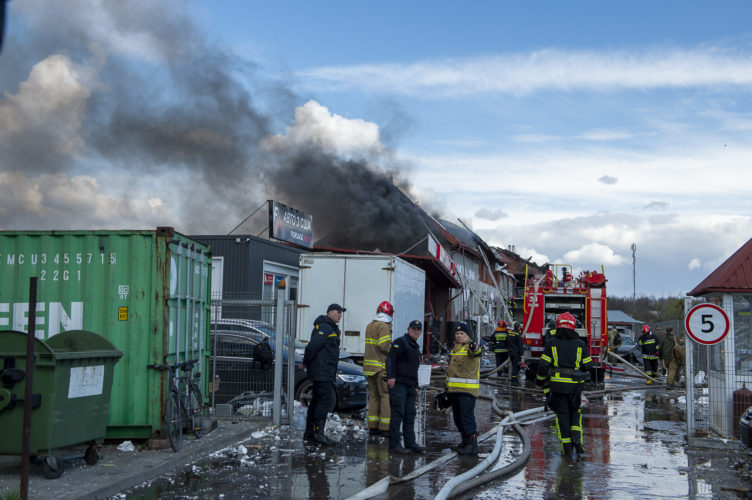
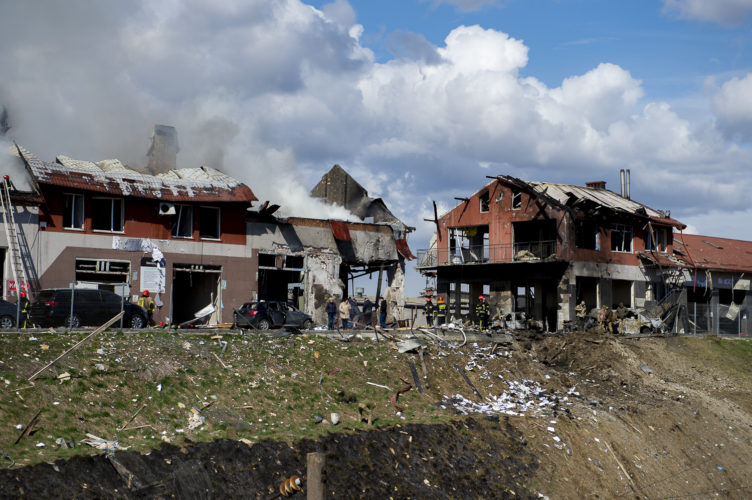
The sound of air raid sirens wailing across Lviv woke us at 7:45.
Our phones started pinging frantically as messages were swapped on social media: there had been a missile strike on Lviv.
The explosions seemed uncomfortably close to the historic city centre where we’re staying though in reality they hit about 6km to the West.
A dense cloud of black smoke crept out from behind the buildings as we peered through windows overlooking Lviv’s Rynok Square. Nervously, we awaited confirmation from Ukrainian territorial defence.
Paul and I decided to follow the smoke. For over half an hour we drove on cobbled streets chasing the smoke cloud as it billowed in the wind, sometimes dense black, sometimes thin. A message from the press centre finally came through giving us a road intersection to aim for.
We were warned to follow strict confidentiality rules on identifying the precise location of the attack. It’s become a criminal offence in Ukraine to give away information that could help the Russians – data, photos and videos on the movement of Ukrainian equipment, military and weapons can all be used to refine missile attacks. “Do not become helpers of the enemy. No sensation is worth the human sacrifice”, the government has warned.
At about 9:30am we passed through a hastily erected checkpoint guarding access to the attack location. Checkpoints are notoriously volatile places in conflict zones, and this was no exception. Nervous soldiers carried guns, scrutinising unfamiliar faces and foreign cars. Some looked in their teens.
We were some of the first journalists to arrive. Our Ukrainian military accreditation press cards seem to carry weight and we drove on through the checkpoint. Barely 50m on, we saw where a missile had struck. It had ripped through the grass creating a huge crater in the earth and debris was sprayed all around. The scars of war.
A man in uniform, smoking a strong cigarette, pointed to where we could park. No cameras allowed, he said. So we went in on foot to see the damage or ourselves. A large building was still on fire above the railway line that’s flanked by two large earth and grass embankments.
Minutes later the air raid sirens started wailing again and we were ushered into a shelter by Ukrainian security personnel. Inside was a crew from CBC – Canadian TV. They were carrying big video cameras. It seemed the soldiers’ mood had changed and Paul ran back to the car to get his stills camera.
When he returned, we walked towards the burning building. By now, rows of ambulances, soft-skinned military personnel carriers and fire trucks were parked in a neat line. The fire brigade briefly pulled out, worried about a ‘double-tap’ attack where a target is bombed, then bombed again soon after to kill first responders at the scene. The Russians perfected this horrendous tactic in Syria.
By this point, smoke was billowing out of the building. You could taste it in the air, pungent and acrid it caught the back of the throat. At one point, an angry civilian gesticulated at us, unhappy that our presence might inadvertently help the Russian’s with their targeting.
As the fire brigade re-entered the building wwe decided to seize the chance to follow in their footsteps, being careful to avoid eye contact in case someone would question what we were doing there.
The floor was covered by two centimetres of fresh water, glistening in the sun, a mirror for the chaos all around.
Paul tucked himself behind a pack of blown-up cars eager to get some shots. I hid behind the remnants of an empty, destroyed kiosque. A solitary, child-sized blue and yellow flag fluttered in the wind.
Shards of glass and plastic covered the floor. Burnt vehicles and fallen masonry quietly marked the blast damage. After a couple of minutes, the head fire officer ordered us to leave the scene.
We joined the rest of the press on the opposite side of the embankment from the fire. Journalists huddled around in their snazzy helmets and flak jackets recording, photographing and filming themselves in front of the fiery backdrop.
Paul and I decided it was time to pull out and head back to central Lviv. Heavy traffic, road closures and tougher checkpoints to pass slowed our pace. At one point, it even started to snow.
We eventually managed to park the car and rushed into the press centre where the Mayor of Lviv, Andriy Sadovyi was holding a press conference,
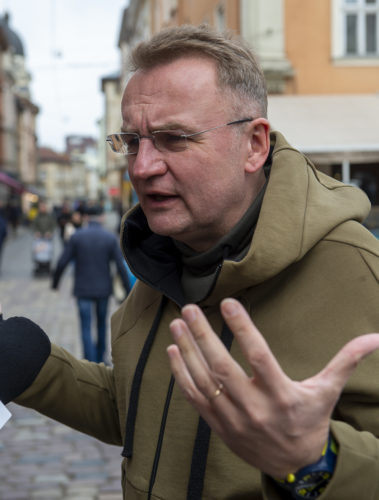
“Russia is a Nazi country, that is the new reality. I expect a strong message from all leaders about this aggression. We must be ready for another attack in my city and cities of West Ukraine. Russian aggressors are killing civilians and that is the reality…I am an optimist, I believe in my victory. We want peace but must be ready for a new Russian attack. Together we must protect our country. We have only one country. I believe in our victory. Never give up”, he told the crowd.
Maksym Kozytsky, the Head Lviv Regional Military Administration, also made a spontaneous press statement: “If you can help by providing weapons, then give us the weapons. If you can help then help, we are ready to fight for our independence. From your side you also have questions to Russians that have not been solved since the Second World War. Please do this.”
Tonight the city of Lviv mourns, its peace has been shattered.
Nina Kropotkine-Watson (text) and Paul Conroy (photography) reporting from Lviv.
Fixing Stories: The Fixer/Reporter Relationship
On 28 March, the Frontline Club hosted a panel, Fixing Stories, on local fixers, producers, and interpreters who assist foreign news organizations. Speakers with extensive experience on both sides of the fixer-reporter relationship in Eastern Europe, the Balkans, and the Middle East included Ukrainian journalist and producer Anton Skyba, former foreign correspondent and novelist Charlotte Eagar, Polish correspondent, broadcast producer, and fixer Magdalena Chodownik, and Istanbul-based photojournalist Bradley Secker.
The group discussed news organizations’ responsibilities to credit and protect their local contributors, the expertise involved in fixing and field producing, the problems of both foreign and local journalists imposing their own narratives and biases on reporting, and the potential for transnational collaboration to overcome those problems. With their range of work across different media, panelists also commented on how the picture of local-foreign partnership varies among print, photo, and video journalism. Audience members included journalists who commented on their own professional experiences and asked about the costs and benefits of anonymity, differences for fixers between working with freelance reporters and with well-resourced news organizations, and the complexities of linguistic translation.
Sociologist Noah Amir Arjomand, a fellow at Indiana University and the Center for International Media Assistance and the author of the recent book Fixing Stories: Local Newsmaking and International Media in Turkey and Syria, moderated the conversation. Dr. Arjomand has also written a piece reflecting on the recent death of a Ukrainian fixer and what it reveals about journalism’s hidden inequalities, which is included below:
On March 14, Fox News announced that cameraman Pierre Zakrzewski had been killed and correspondent Benjamin Hall injured by incoming fire on the outskirts of Kyiv. Among local journalists, however, word spread that a third team member had also lost her life: Oleksandra “Sasha” Kuvshynova, a 24-year-old Ukrainian national.
Long-simmering tensions boiled to the surface over international news organizations’ treatment of local “fixers” like Kuvshynova. These journalists provide essential labor in gaining access to sources, providing research, and making sense of events — but are often treated as second-class citizens within the profession.
Ukrainian journalist Anton Skyba was outraged that it seemed Fox News was commemorating Kuvshynova’s foreign colleagues while ignoring his compatriot. He and others obtained an image of Kuvshynova’s Fox News press card and evidence that she represented the channel as a producer in official communications. After local reports about Kuvshynova, Fox News Media CEO Suzanne Scott offered a new statement mourning her death and acknowledged that she was “helping our crews navigate Kyiv and the surrounding area while gathering information and speaking to sources,” adding, “We held off on delivering this devastating news earlier today out of respect for her family.”
Skyba remains skeptical of this explanation. For him, the channel’s initial failure to recognize Kuvshynova was emblematic of a broader “colonial approach” of too many foreign media organizations in Ukraine who treat their local contributors as inferiors and even expendables. Skyba complained that outlets pay Ukrainians less and trust foreign journalists more to set the news agenda and frame stories: “They believe that they know the country better… they know better the ways the story should be cooked. They are ignoring local and cultural context.”
The very terminology for local news contributors is fraught with controversy. Fox News’s statement referred to Kuvshynova with the ambiguous appellation “consultant.” Most journalists described her as a “fixer, ” though others pushed back. Diversity advocate Marcus Ryder tweeted, “They are not ‘fixers’ they are journalists. They are not ‘fixers’ they are production managers. They are not ‘fixers’ they are producers. RIP Oleksandra Kuvshynova.” Wall Street Journal editor Anthony DeRosa asked, “Can we also stop using ‘fixer’ as the way we refer to these essential journalists?” Skyba himself hates being called a fixer when he does more than just share contacts; when he helps to develop a news story, conducts interviews, and contributes expert political knowledge, he expects to be credited with the more professional title “producer.”
These labels matter in moral and material ways, signifying or refusing recognition of news contributors’ professionalism and their employers’ obligations toward them. Labeling local journalists as “fixers” can be “a way for media organizations to escape responsibility,” Skyba told me, to signal that their contributions are minor and informal.
In Kuvshynova’s case, Skyba and others worried that Fox News’ initial non-recognition would translate to inattention to her survivors, which is why they scrambled to collect evidence that she was an integral member of the team. The Kyiv-based nonprofit Institute for Mass Information (IMI) has since hired lawyers in the US and Ukraine to help ensure that Fox News provides appropriate support to her family, representative Iryna Zemlyana told me.
At the heart of controversies about the status of journalists like Kuvshynova is what I call the Fixer’s Paradox: Local connections are both their greatest asset and their greatest liability. They convince sources to talk, arrange logistics and security, and explain contexts and translate meaning. Foreign colleagues who lack their range of local knowledge and contacts could not operate effectively without them. News organizations would have to rely on propagandistic official narratives or parrot received wisdom (as they often do nonetheless, despite the efforts of fixers and reporters on the ground).
Yet fixers’ local ties can also taint them in the eyes of their foreign employers as more activist than professional, not objective enough to be trusted with editorial decisions or respected as full peers. Concerns about fixers’ biases or blind spots can be justified, but all too often, foreign reporters and editors dismiss local colleagues’ perspectives to protect their own privileged control over news stories and insulate their own subjective biases from interrogation.
For his part, Skyba sees progress in de-colonizing journalism and earning the respect of international news organizations. Ukrainian journalists, who have long navigated combat zones and disinformation campaigns and received training from organizations like the IMI, are proving themselves better prepared to cover the full-scale Russian invasion than foreign newcomers, he told me. “We are demanding and fighting every day for them to recognize us more… This is the recognition [earned] by risking our lives, by decision-making, by showing the knowledge that a local journalist brings to the field.”
by Noah Arjomand
Fellow for the Centre for International Media Assistance (CIMA)
Noah is a sociologist and author of the new book Fixing Stories: Local Newsmaking and International Media in Turkey and Syria.
#StraightFromTheFrontline
Straight From The Frontline (#SFTF) is a new initiative aiming to provide urgent practical help to support freelance journalists on the frontline in Ukraine.
It’s a development from the Frontline Club Freelance Registry ‘FFR’ which has experience of providing press cards and equipment, and continues to be a collective voice representing freelancers’ interests.
The SFTF campaign has a set target of raising £100,000 for the cause.
As well as providing freelancers with material and logistical support, it aims to create a 24/7 home base in Lviv for journalists travelling in and out of Ukraine; a place to gather safely, to network and pick-up gear.
In remembrance of Pierre Zakrzewski, Oleksandra Kuvshynova, Brent Renaud, Victor Dudar, Yevhenii Sakun, Oksana Baulina.
A month into the war, the Ukrainian people were stunning the world with their steely resilience.
Back in London the club was buzzing. People were rushing up and down the stairs, holding secret meetings, huddled in booths, scribbling notes on paper and onto laptops.
Long evenings turned into nights. Cups of coffee were exchanged for Negronis. Something was cooking at the club.
Frontline’s in-house team was being supported by branding and communications experts to help plan a media stunt at the Russian embassy in Notting Hill Gate. We planned to project an image of the Ukrainian flag across the building.
Sunday, March 20th
The extended production team gathered in the club. We sat around the large club table, admiring the posters and placards, and a 5m long banner, freshly printed with the faces of the five journalists who’d died doing their job in Ukraine.
Tonight was about paying them a tribute, celebrating their memory, encouraging others to continue to bear witness.
As the plans were finalised, we headed off to our location for a final recce.
The recce
The Russian embassy is located on the north west corner of Hyde Park. It’s a vast three storey, off-white building guarded by a couple of bare oak trees. In truth, it’s a little scruffy and looks as if it’s seen better days.
The gate was locked, the curtains were closed. A sad-looking Russian federation flag fluttered in the breeze.
Two bored policemen stood cross-armed, mumbling to each other as a handful of protesters held up cartoons of Vladimir Putin. They waved tinted yellow and blue cardboard in front of the passing crowd.
We planned the final positions for our ‘action team’ of celebrities and journalists. Actress Rosamund Pike – who played Marie Colvin in the film ‘A Private War’ had agreed to attend alongside Paul Conroy, Marie’s long-time photographer and close friend.
The actress Natascha McElhorne, the author Charles Cumming and the documentary-maker Waad Al-Kateab – who made ‘For Sama’ – had all agreed to attend alongside Ben De Pear, Carole Cadwalladr, Natasha Fairweather, Lynne O’Donnell and familiar faces from Frontline including Vaughan Smith.
We planned for them to stand right in front of the embassy, squeezed in between the security barriers and the main road.
The van carrying the projector was expected to pull up at 20:00 on a double yellow line. The idea was to project onto the building from inside the van and keep the image up for as long as possible to make the point. We feared the police would intervene.
The protest
Everyone on the team RV’d at the Champion pub 20m from the embassy. Spirits were high, excitement palpable; drinks were being served. Within minutes, our crowd had taken over the entire ground floor.
At 19:58 with 2 minutes to spare – and to the landlord’s great relief – we set off. The van as planned had pulled up outside the embassy.
We marched across the main road towards the embassy carrying placards and the banner. The building was bathed in blue and yellow light, the colours of the Ukrainian flag. The protest team held its posters high in front of the embassy. It was a proud moment for Frontline Club.
We’d arranged for video and stills media to be there. Our celebrity supporters gave some powerful statements.
Rosamund Pike: “Journalists bring us the truth from the ground and for that truth they so often killed. It happens all over the world and it’s happening now in Ukraine. Journalists are being targeted and not killed by accident. The people we have in our arms today,
above our heads, are the journalists that have been killed and that needs to stop because we need the stories, the world needs the stories, the world needs the truth.”
Carole Cadwalladr: “There is a war against truth happening right now and we can see that so clearly in Ukraine. If we don’t have journalists reporting from Ukraine, we’re not going to know what is happening there and lies will win, Putin will win.”
Contrary to our fears, the police officers were actually helpful and made no attempt to stop us from protesting. Instead, they deployed orange cones to protect us from the passing traffic as cars sounded their horns in support. The police were sympathetic to the cause.
After about 30 minutes of projection, interviews – and high emotion – the projector was turned off and the embassy returned to darkness, its flag looking even sorrier than before.
Nina Kropotkine-Watson
A Moment of High Peril
Vladimir Putin appears to be running short of men and materiel in Ukraine. He may be about to play dirty…
The Battle For Ukraine’s Cities
Almost exactly 30 years after Bosnian Serbs began shelling Sarajevo, large European cities are once again being besieged. Sarajevo survived – but can Kharkiv, Mariupol and Kyiv?
BATTLE FOR UKRAINES CITIES
Frontline Christmas Fair
Public Welcome 1pm-5pm
Members & By Invitation Only 6pm-10.30pm
“Wherever I am travelling, I buy scarves. In many countries, textiles provide a
vital income for women. I am delighted that this Christmas the Frontline Club will
be showcasing handicrafts from countries which should be associated not only
with war, but also with their glorious cultural heritage.” – Lindsey Hilsum –
Channel 4 News International Editor & Advisory Board Member of the
Frontline Club
The Frontline Club is a gathering place for journalists, photographers and other
likeminded people interested in international affairs. It champions independent
journalism and freedom of speech and campaigns for the protection of press
freedom and the safety of freelancers around the globe.
This year it has chosen to hold a Christmas Fair alongside its annual drinks
party on 9 th December 2021 with a selection of charities and enterprises that
sell handcrafted items from many of the countries that Frontline Club members
report from and work in.
Care a lot. Give a little.
Support artisans from Asia, Africa and the Middle East and make a
difference to families in the places behind the headlines, as well as help
fundraise for The Frontline Club Charity.
“Artisans keep culture alive in places torn by conflict. Help them keep telling a
different story,” – Lyse Doucet – the BBC’s Chief International
Correspondent & Advisory Board Member of the Frontline Club
There will be products ranging from glass baubles from the Holy Land, Ottoman
silks, Egyptian leatherwork fashioned by women in Cairo’s City of the Dead,
Afghan and Pakistani jewellery, homeware inspired by the Mughal court,
cushions stitched by Syrian refugees and much more!
WHO WE ARE
A group of vendors that have previously collaborated with Leighton House
Museum and the Aga Khan Centre, this Christmas we are partnering with the
Frontline Club which presents a great location as well as the kind of well-
travelled, socially minded crowd to which our products should appeal.
Bethlehem Baubles partners with Bethlehem Fair Trade Artisans (BFTA) who
work closely with Muslim and Christian communities at an individual level to
produce hand-decorated glass baubles that make unique gifts from the heart of
the Holy Land.
Ishkar helps craft thrive in challenging contexts. Its clothing, jewellery and
homeware has been handcrafted in places that are, or have been, affected by
conflict or political turbulence. By supporting these artisans Ishkar aims to bring
vitality to our shared global heritage, change one-sided narratives and create
economic opportunities where they are desperately needed.
MISHKĀ produces beautiful leatherware handcrafted by women living among
Cairo’s historic Mamluk monuments in the “City of the Dead”, using traditional
techniques and the finest natural materials. Training and design support by
designers, including leather designer Bill Amberg and jewellery maker, Tania
Clarke Hall, provides the women with the skills to produce these products,
which are sold for the benefit of their families and themselves.
Nimuri sells homeware made by Pakistani artisans, supporting heritage craft
skills and creating beautiful and unique products that tell a story about the
country’s rich artisanal history. It sources from small family-run enterprises,
charities and not-for-profit organisations.
Ottoman Silks reproduces fabrics from the illustrious Ottoman Empire. The
collection comprises of six elegant designs that were originally commissioned
and worn by the Ottoman Sultans and their royal court. Its exclusive range of
kaftans, waistcoats and accessories is unique in its combination of heritage and
contemporary designs and has been made to the highest standard.
Sabbara is a small social enterprise selling cushions, bags and shawls
embroidered by displaced Syrian women. Many have lost their husbands and
are now caring for their children without support, often with low levels of literacy
and no skills with which to earn a living. Half are displaced within Syria, and
trying to survive in a country devastated by ten years of war. The rest are in
neighbouring Lebanon, where 99% of refugees live below the poverty line.
S Jo draws inspiration from traditional textile techniques to produce original
accessories handcrafted by artisans, mainly female, in Pakistani villages. Its
signature jewellery collections value each individual craft woman’s creativity,
provide opportunities for fair income and a creative space for artisans to
develop their craft practice.
For further information, images or interviews with the stallholders, please
contact: Eleanor Khan on +44 (0)750 1839210 or Cathy
Giangrande +44 (0)778 9991411
Contact-Us-About_Membership-2
Contact us about Membership
13 Norfolk Place,
London W2 1QJ,
Tel: +44 (0)20 7479 8950
Closest Tube Stations:
Paddington, Edgware Road and Lancaster Gate.
Clubroom opening hours:
Monday to Saturday from 8am till late
Event Submission Page
Your idea will be considered by the Frontline Club Charitable Trust panel, if it goes through to the next round you will be contacted for more details.
QUO VADIS, AIDA?
SCREENING DISCUSSION with Writer/Director Jasmila Zbanic and Journalist, war correspondent & Author Janine di Giovanni
“Quo Vadis, Aida?” could do for the Srebrenica massacre what “Schindler’s List” accomplished for the Holocaust. – ForeignPolicy.com
Nominated for the 2021 BAFTA award for Best Director and Best Film Not In The English Language and for the 2021 Academy Award for Best International Feature.
Srebrenica is no longer just the name of a town. It represents the worst of human cruelty and an act that many had hoped was expunged from European history with the end of the Second World War. Jasmila Zbanic’s drama unfolds in 1995, just as the Serbian army have entered the mostly Muslim Bosnia town. Aida is a translator for the UN. Her family is among the thousands of citizens looking for shelter in the UN camp. But as an insider to the negotiations, she has access to crucial information that forces her into the untenable position of deciding between her obligation to those she loves and the role that has a wider impact. Zbanic’s humanity, locating her story on a relatable level, within an event that many of us might find impossible to comprehend, is what raises ‘Quo Vadis Aida’ far above the level of the standard war film.
Journalist, war correspondent & Author Janine di Giovanni
Writer/Director Jasmila Zbanic
The Golden Rule
BOOK TALK
THE GOLDEN RULE
Thursday 13th May 7pm BST
With Amanda Craig & host Kelly Falconer
A highly enjoyable story about female resilience and finding fulfilment on your own terms, with a twist that is all the more compelling for its unexpectedness ― Sunday Times
Amanda Craig’s new novel turns on two women who meet by chance and discover that they are both victims of abusive husbands. Together, they plot their revenge.
DNA Of The Iconic Image
Main Photograph above, Don McCullins, Shell-shocked US Marine, The Battle of Hue
PHOTOGRAPHY TALK
DNA OF THE ICONIC IMAGE
Thursday 6th May 7pm BST
Part of series with photographer
Carol Allen-Storey
Panel:
Fiona Shields – Head of photography at the Guardian newspaper, London
Brandei Estes – Head of photography Sotheby’s London
Stuart Smith – is the director and founder of GOST Books, an independent visual arts and photography publisher
Cornell Watson – documentary photographer, created the award winning series, ‘Behind the Mask’., created the award winning series, ‘Behind the Mask’.
Vaccine Diplomacy
The Covid-19 pandemic marks the first time in modern history that all of humanity has experienced the same invisible public health menace at once. It has also revealed deep fractures in the multilateral approach to vaccine distribution – with production hoarded and even blocked, and with many countries left to fend for themselves.
Meanwhile, taking advantage of the abdication of US leadership and hoping to showcase their own global health leadership, China, India and Russia are donating millions of doses to countries but with strings attached which are not always evident to recipient countries. Everything now seems more political and the pandemic is no exception.
This panel of international experts and journalists will discuss the current dire situation, the hidden costs for countries accepting vaccine donations, how soft power is being flexed, and what the playing field could look like in future pandemics.
Moderated by Michael Bociurkiw.
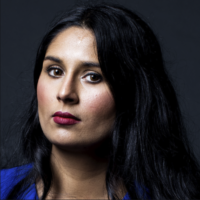
Dr. Syra Madad is an American pathogen preparedness expert and infectious disease epidemiologist.
Cordelia Lynch is a US Correspondent for Sky News
Steve Tsang, director of the SOAS China Institute at the SOAS University of London.
Anna Nemtsova, permanent Moscow correspondent for The Daily Beast.
Irish Mother & Baby Homes Scandal
Virtual Screening PLUS Discussion
We will be showing a 30 minute film followed by a discussion.
In a specially edited episode of People and Power, filmmaker Callum Macrae and reporter Laurence Lee investigates deeply disturbing allegations that both the Irish state and its religious orders were responsible for a systematic decades-long regime of institutional neglect and exploitation involving the death of thousands of children.
Panel:

Maureen Considine is a Researcher and Co-founder of Cork Survivors and Supporters Alliance.

Ann O’Gorman, who was 17 when she gave birth to her baby daughter Evelyn in Bessborough Mother and Baby Home in Cork. Evelyn was one of over 900 babies believed to have died in Bessborough before being buried in unmarked graves
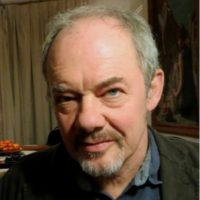
Callum Macrae, an Emmy- and Bafta-nominated writer and film-maker whose credits include No Fire Zone: The Killing Fields of Sri Lanka
Moderated by Channel 4’s Social Affairs Editor Jackie Long
others TBC.
DADLAND with Keggie Carew
Book Night
Tom Carew was 24 when he parachuted into Nazi-occupied France under the cover of night. He was part of the secret Operation Jedburgh, the motto of which was “Surprise, Kill, Vanish”. His role was to liaise with the local resistance, and even in daredevil company he was notably enterprising and brave, later escaping from the German army through a sewer and taking refuge with some nuns. He won the Croix de Guerre, but this was nothing to his exploits a few months later in Burma, where he organised a series of ambushes by guerrilla groups that caused significant damage to Japanese forces. Celebrated as “Lawrence of Burma” and “the Mad Irishman”, Carew was the youngest officer ever to be awarded a Distinguished Service Order.
Tom Carew was a war hero and an unconventional father with heaps of charm. When he began to lose his memory, his daughter set out to write this fascinating memoir. – Guardian reviews
Dadland won the Costa Biography Award 2016.
Afghanistan 20 Years On
Picture above: Tarana Akbari, 12, screams after a suicide bombing at Abul Fazel Shrine in Kabul on Dec. 6, 2011 Photograph: AFP/Massoud Hossaini.
It is almost 20 years since the Taliban regime was removed from power in Afghanistan and the Allied military engagement in the country began. Any change made is now threatened as the United States seeks a way to broker peace with the insurgents. Massoud Hossaini is an Afghan photographer who won a Pulitzer prize for his heart-wrenching picture of a young woman in the aftermath of a suicide bombing at a Shia mosque in Kabul. Rupert Frere is a soldier in the British Army, who as a photographer has chronicled life on the military frontlines. They will discuss their work on their very different frontlines. They will be joined by Weeda Mehran, an Afghan academic who specialises in conflict and insurgency. And Waliullah Rahmani, an academic, analyst and media entrepreneur. Moderated by Lynne O’Donnell, author and journalist, bureau chief in Afghanistan for The Associated Press and Agence France-Presse (2009 and 2017).
More info:
With Pulitzer Prize Winning Photographer Massoud Hossaini, born in Kabul in 1981, during the Soviet occupation. His family fled to Iran when he was six months old. As a young adult, Massoud became involved in activism and began to record the events he witnessed through photography. In 2002, after 9/11 and the start of the US war in Afghanistan, Massoud returned to his home country and received training from the AINA Afghan Media and Cultural Center in Kabul. He was a staff photographer for AFP & chief photographer for The AP between in 2007 and 2019. He is currently studying for a degree in political science at the American University of Afghanistan. He has won a breaking-news Pulitzer Prize in 2012, as well as the World Press Photo award the same year.
Lynne O’Donnell, journalist & author. Between 2009 and 2017 she was Afghanistan bureau chief for AFP and The Associated Press. She completed an MA in war studies at King’s College London in 2019. She writes about Afghanistan for Foreign Policy magazine, among others, and is working on her next book.
Dr Weeda Mehran, a lecturer (Assistant Professor) at the Department of Politics and the Director of MA in Conflict, Security and Development at the University of Exeter.
Rupert Frere, an award-winning Combat Photographer, a highly experienced photographic instructor with a twenty-two-year career in the British Forces.
Waliullah Rahmani, an academic, analyst and media entrepreneur.
The Influence Of Ethnic Diversity in Photography
What are the challenges and cultural sway for black and ethnic diversity in the photographic world?
With
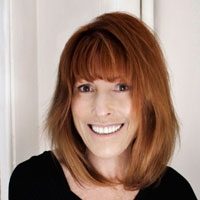
Host: Carol Allen-Storey is an award-winning photojournalist
Panel Below:
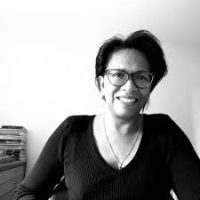
Jennie Ricketts is a photography editor, curator, consultant and mentor. She is a former Picture Editor of The Observer Magazine,where she worked for seventeen years
Polly Irungu is a multi-media journalist and founder of Black Women Photographers, a global community and on-line database of Black Women and non-binary photographers.
Song Chong PhD – Curator | Professor of Photography and Theory at NYU & The New School. Guest Lecturer at Fordham University Trustee at the Martin Parr Foundation
Jermaine Francis, a London based photographer who works within discourse of the document & portraiture, in the format of personal driven Photo projects & Editorial
Environment – Plastics in Our Oceans, How To Turn The Tide
Moderated by environmental scientist and former environment editor of the Sunday Times, Jonathan Leake. Nearly three billion people depend directly on marine and coastal biodiversity for their survival. By absorbing approximately a third of carbon dioxide emissions, oceans play a decisive role in regulating the climate. As a source of life, they are therefore crucial to the very fate of humanity. Yet, we dispose of over 8 million tonnes of plastic in the seas every year.#environmentalfrontline is a regular series of events that concentrate on the burning environmental issues of the day, curated and organised by Clear Public Space.
Book Night – How To Stay Sane In An Age Of Division
Ours is the age of contagious anxiety. We feel overwhelmed by the events around us, by injustice, by suffering, by an endless feeling of crisis. So, how can we nurture the parts of ourselves that hope, trust and believe in something better? And how can we stay sane in this age of division? In this powerful, uplifting plea for conscious optimism,
Booker Prize-nominated novelist and activist Elif Shafak draws on her own memories and delves into the power of stories to bring us together. In the process, she reveals how listening to each other can nurture democracy, empathy and our faith in a kinder and wiser future.
ARTconnects Creative Forum – Representation Of Migrants/Refugees
Reporting Democracy’s Faultlines
PANEL DISCUSSION
Are we living in a new age of protest? Journalists who have been covering some of the world’s most dramatic recent protests and civil unrest will discuss how people across the political spectrum are making their voices heard, and with what consequences.
Featuring BBC Newsnight International Editor Gabriel Gatehouse, Oscar-shortlisted filmmaker Anders Hammer, ITV News Washington producer Sophie Alexander and Sudanese-British foreign affairs reporter, writer and producer Yousra Elbagir. Moderated by freelance journalist Zoe Flood.

Gabriel Gatehouse is BBC Newsnight’s International Editor and an award-winning foreign correspondent with over a decade’s experience of reporting from around the globe. Gabriel recently won a Foreign Press Association for his Newsnight film on the Hong Kong protests ‘The battle of PolyU’, and has also covered pro-Trump protests in the aftermath of the US elections. After previous postings for BBC News in Africa, Europe and the Middle East, he is now based in London.
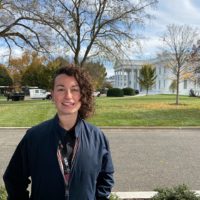
Sophie Alexander is the Washington DC producer for ITV News. Along with correspondent Robert Moore and camera operator Mark Davey she was part of the only news crew in the world to enter the Capitol with pro-Trump rioters on January 6. Sophie also covered protests in Louisville following the shooting of Breonna Taylor and has explored the rising tensions in the US for the past year, producing at both pro-left and pro-right protests and interviewing militia, Antifa and QAnon supporters.
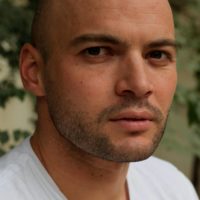
Anders Hammer is an award-winning filmmaker and investigative journalist whose latest film ‘Do Not Split’, filmed from the heart of the Hong Kong protests, was recently shortlisted in the Best Short Documentary category of this year’s Academy Awards. Hammer has directed a number of other documentaries, including about the refugee crisis and militias in Iraq and Syria, and previously lived and worked in Afghanistan for six years.

Yousra Elbagir is a Sudanese-British foreign affairs reporter, writer and producer. She is the co-host of a new Vice TV series ‘Black Lives Matter: A Global Reckoning’, which explores the Black civil rights movements in various countries in the world. She reported extensively from Sudan during the youth-led 2019 Revolution for Channel 4 News and the Financial Times.
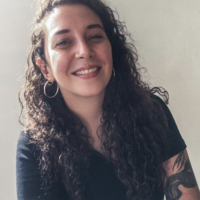
Sumy Sadurni is a freelance photojournalist in Uganda. She documents society, politics, gender rights and environmental stories from across East African region. She extensively covered the run up of the Ugandan elections over 2020 and 2021, and closely followed presidential candidate Bobi Wine as he challenged President Yoweri Museveni, who has been in power for 32 years.

Moderator:
Zoe Flood is a multimedia journalist based between Nairobi and London, covering security, human rights, and economic and social issues.
Photography – The Most Influential Photos Ever Taken
©Philip Jones-Griffiths Vietnam Inc. (large picture above)
Powerful photography is a form of bearing witness, a way of bringing a single vision to the larger world, creating a strong empathy for the story telling, demanding a call to action, because they can create a persuasive atmosphere where change is possible.
A series of talks related to the influence and impact of the still photograph with Documentary Photographer Carol Allen-Storey.
With Aidan Sullivan, CEO and Founder Verbatim Photo Agency, represents some of the worlds most respected film makers and photojournalists. New York, Harriet Logan, Founder & curator of the INCITE project An active collection of photographic prints supporting photographers who strive for social and political change through their work. Monica Allende – The London-based curator, producer and educator is the director of Format International Photography Festival and artistic director of Getxophoto. Donna Ferrato – An internationally acclaimed photojournalist known for her ground breaking documentation of the hidden world of domestic violence.
World Briefing 2021 – Foreign Correspondents & Experts Discuss World News
Panel Discussion Moderated by Michael Bociurkiw.
Joined By:

Janine di Giovanni a multi-award winning journalist and author, a Senior Fellow and Professor at Yale University’s Jackson Institute for Global Affairs
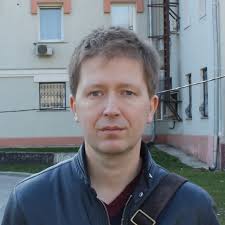
Andrei Soldatov, Russian investigative journalist and Russian security services expert, co-founder and editor of the Agentura.Ru and author of the recent book The Compatriots.
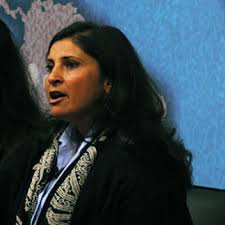
Lina Sinjab is BBC Middle East Correspondent based in Beirut.

Michael Vatikiotis is a writer, journalist, and private diplomat working in Southeast Asia since 1987. He was formerly editor of the Far Eastern Economic Review and a correspondent for the Hong Kong-based news magazine for 16 years

Ayla Jean Yackley is a freelance journalist based in Istanbul.

Michael Holmes is an award-winning anchor and correspondent for CNN International based at the network’s headquarters in Atlanta.
BOOK NIGHT:THE AUTUMN OF THE ACE with Louis de Bernières & Kelly Falconer
A different format to our usual events, Book Nights will randomly offer five attendees to join the author and the host (with video), the rest of the audience will be muted but will be able to post or ask questions live.
Hosted by Kelly Falconer
The idea is to encourage reading and discussion of reading, and to end the night happier and wiser than when it began.
Louis de Bernières‘ new novel is a moving account of an extraordinary life in extraordinary times. This coming-of-old-age story illuminates both the effect of two World Wars on a generation and the irrepressible spirit and love that can connect people despite great obstacles.
BUY FROM
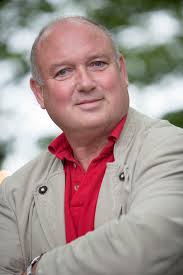
Louis de Bernières is the author of eight critically acclaimed novels and one collection of short stories. He was selected by Granta magazine as one of the twenty Best of Young British Novelists in 1993. Captain Corelli’s Mandolin (1994) was an international bestseller and won the Commonwealth Writers’ Prize.
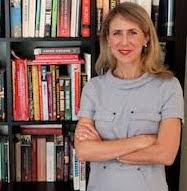
Kelly Falconer is the founder of the Asia Literary Agency, which represents Asian writers, experts on Asia and writers living in the region.
COUP 53 Documentary Q&A with Walter Murch and Taghi Amirani
****You can watch the film at your own time via the link below available until end of February
https://watch.eventive.org/coup53/play/6011b7cf3f8be60030cc5f72
Larushka Ivan-Zadeh will be hosting the Q&A. She is a film critic at The Times, Film Editor at The Metro and a contributor to Radio 4‘s Film Programme.
While making a documentary about the CIA/MI6 coup in Iran in 1953, Iranian director Taghi Amirani and editor Walter Murch (Apocalypse Now, The Conversation, The English Patient) discover never seen before archive material hidden for decades. The 16mm footage and documents not only allow the filmmakers to tell the story of the overthrow of the Iranian government in unprecedented detail, but it also leads to explosive revelations about dark secrets buried for 67 years. Working with Ralph Fiennes (The Grand Budapest Hotel, Schindler’s List, The English Patient) to help bring the lost material to life, what begins as a historical documentary about four days in August 1953 turns into a live investigation, taking the filmmakers into uncharted cinematic waters. The roots of Iran’s volatile relationship with America and Britain has never been so forensically and dramatically exposed.
PICKED FOR THE 5 BEST DOCUMENTARIES OF 2020 BY THE WASHINGTON POST
This powerful and authoritative documentary by the Iranian
filmmaker Taghi Amirani is as gripping as any thriller
Peter Bradshaw – The Guardian
Both as a detective story and as a deep dive into a world event
whose consequences linger, it is bracing, absorbing filmmaking
Ben Kenigsberg – New York Times
The film’s editor is Walter Murch, who worked on
“The Conversation” and “The Godfather: Part II” (both 1974),
so there’s not much that he doesn’t know about conspiracy
—how it leaks into a movie like the smell of drains
Anthony Lane – The New Yorker
The Power of the Still Image: Inspiration for photo series during Covid
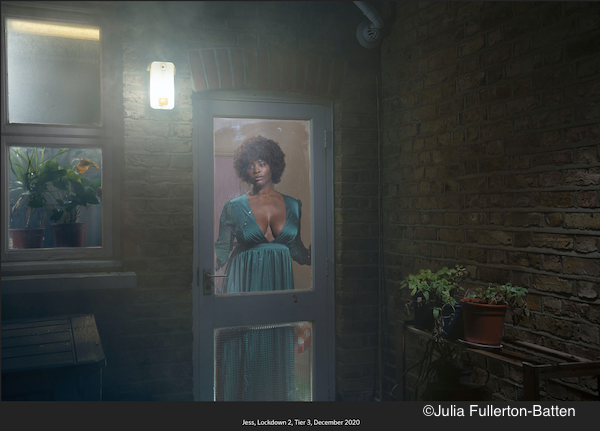
DISCUSSION
Thursday 4th February, 7pm (GMT)
THE INSPIRATION TO CREATE PHOTO SERIES DURING COVID
A series of talks related to the influence and impact of the still photograph in conversation with documentary photographer Carol Allen-Storey.
The still photo captures a moment in time allowing the viewer to slow down and think, be reflective. It allows for greater emphasis and has fewer distracting elements than the moving image, giving the viewer more freedom to absorb, contextualise and focus on the elements. It allows for contemplation. Like classical music, you can return, re-interpret and discover aspects not experienced before with greater appreciation.
Photographs importantly preserve historical events, whether from a socio-political vantage through to highly personal experiences of marriage, births, family life. Photographs are global stories, personal stories, timelines of humanity recorded for prosperity.
PANELISTS
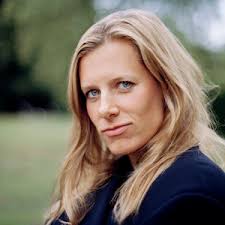 Julia Fullerton-Batten
Julia Fullerton-Batten
Hyper-realism and cinematic are characteristic descriptions of Julia Fullerton-Batten’s images. They are often set in unexpectedly surreal settings with dramatic lighting, communicating simultaneously both tension and mystery. Julia’s most recent awards include: The International Center of Photography, NY
International Photography Awards, Lucie Trophy, Photo Vogue Festival, 2020, all related to this powerful series reflecting life from within during the pandemic.
Title: ‘Looking Out from Within’
Peeking in from outside her neighbours’ windows, Julia created elaborate, cinematic tableaux, voicing their stories from a distance during the COVID-19 Lockdown.
http://www.juliafullerton-batten.com
 Fabio Bucciarelli
Fabio Bucciarelli
Fabio Bucciarelli is a photographer, journalist and author known for his documentation of conflicts and humanitarian consequences of war. He has spent the last decade covering the world’s major changing events and creating images which reflect his commitment and empathy with the story.Bucciarelli has been recognized with some of most prestigious award in the profession including the Robert Capa Gold Medal, World Press Photo Award, Perpignan’s Visa d’Or, POYi Photographer of the Year and Lucie Impact Award. Today Fabio is a frequent contributor with The New York Times.
Title: COVID-19First Wave Coverage, Italy | 2020
“We Take the Dead From Morning Till Night”
At the moment when the coronavirus was ripping through northern Italy, working on assignment for The New York Times, Fabio gained exclusive access to the Red Cross workers who were going door to door around Bergamo, the hardest hit part of Italy’s hardest hit region, to check on those who were infected and take the worst of them to the hospital.
https://www.fabiobucciarelli.com
 Alys Tomlinson
Alys Tomlinson
Alys is an editorial and fine art documentary photographer based in London. She recently won 1st prize in the National Portrait Gallery Taylor Wessing Photographic Portrait Prize for her series ‘Lost Summer’. And was also named Sony Photographer of the Year in 2018.
Title: ‘Lost Summer’
The series consists of 44 portraits of north London teenagers who had their proms cancelled due to the pandemic. The images capture the poignancy of a lost summer for young people who were unable to sit their school exams and had nothing to mark this significant step in growing up and leaving school.
http://www.alystomlinson.co.uk
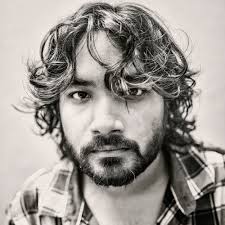 Ismail Ferdous
Ismail Ferdous
Born in Dhaka, Bangladesh. As a documentary photographer, Ismail covers social humanitarian issues. His recent projects, The Cost of Fashion, a photo and video advocacy project that began after documenting the Rana Plaza factory collapse, the worst industrial disaster in history. Ismail was winner of The Manuel Rivera-Ortiz Foundation for documentary photography, the Getty Images-Instagram Grant winner 2015, Awarded 1st Prize, Professional General News category in the “Prix de la Photographie”.
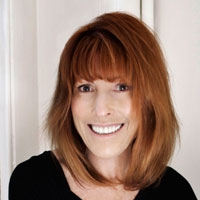 Carol Allen Storey
Carol Allen Storey
Carol is an award-winning photojournalist specialising in chronicling complex humanitarian and social issues.
In Solidarity- The Migration Blanket
In Solidarity- The Migration Blanket is a collaborative artwork created during COVID-19 by Refugee and Asylum Seeker girls and women around the world and international artist and Human Rights Activist , Salma Zulfiqar. As we approach the the International Migrants Day (18th Dec), the work shines a light on the need for compassion, tolerance and acceptance of Refugees and Migration and gives refugee and asylum seeker girls and women a voice through creative expression. 30 girls and women, representing over 20 nations and 5 continents took part in the project and is a call for solidarity with refugees as we head out of lockdown.
Please note that this project took place online during the height of COVID-19 in 2020 connecting vulnerable girls and women in the West Midlands, London and Manchester, UK to a global community where they broke the cycle of isolation, learned creative skills and about human rights. Girls from refugee camps and orphanages all over the world participated. They contributed to this international collective digital artwork breaking boundaries and creating new friendships during the global pandemic which has crippled societies around the world. The positive impact of this project on their lives has been wide ranging. ARTconnects is still in touch with all participants who are engaging in screening events for the project.
– London screening: https://www.
Supported by H.E Vanja Filipovic , Ambassador of Bosnia and Herzogovina to the UK.
– Artwork trailer: https://www.youtube.
